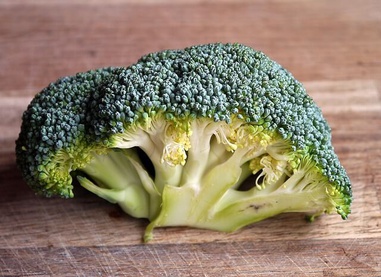According to an American study, broccoli would also protect against respiratory inflammations caused by the polluted air we breathe. People with weak lungs are usually victims of respiratory inflammation resulting in asthma, asthmatic bronchitis or chronic bronchitis.
During the study, participants were subjected to different diets. For three days, the first group ate more than 100g of crushed broccoli daily. The second group, considered the placebo group, ate the same amount of alfalfa sprouts.
In the broccoli group, the researchers observed twice the level of "phase 2" enzymes as in the placebo group. These "phase 2" enzymes help fight against various daily aggressions such as polluted air or cigarette smoke, which are often the cause of respiratory inflammations such as asthma or allergic rhinitis.
Remember that this set of positive virtues of broccoli is explained by the fact that it contains glucosinolates which are transformed into sulforaphanes during chewing. Alfalfa, on the other hand, is devoid of this substance.
Broccoli protects your eyes
The degeneration of the retina is of course linked to age, but it results from the damage caused by the accumulation of certain metabolic waste products that generate oxidative stress. The retina is a very sensitive tissue and particularly vulnerable due to its exposure to light. It is the seat of an important metabolism which, like any metabolism, leads to the production of waste. Waste that must of course be disposed of and protected. This is what sulforaphane does, protecting all cells from oxidative stress.

Broccoli, the vegetable elected king of protectors
Currently, many researchers agree on the importance of a substance called sulforaphane, particularly present in broccoli. This substance stimulates the natural defense mechanisms that protect various essential systems of our body. This protective action is exerted as well at the level of the arteries, the stomach, the eyes as on the lungs, and also in prevention of cancers.
Broccoli protects your arteries
The arteries as a whole do not become uniformly clogged. In fact, in areas where blood flow is slower, deposits tend to accumulate in a more significant way, giving rise to atheromatous plaques, which can be the cause of infarctions or thrombosis, among other things.
Within our body, there is a protective protein called Nrf2. The latter is unfortunately inactive in the risk areas of the circulatory system. This is where sulforaphane comes into its own, as it activates the production of this protective Nrf2 protein, and prevents inflammatory mechanisms, even in high-risk areas.
Broccoli against gastric ulcer and helicobacter pylori
A team of Japanese researchers has just demonstrated that broccoli helps to fight against helicobacter pylori infections, a bacterium often present in cases of stomach ulcers and which would promote cancer of this organ.
For 8 weeks, the researchers followed 48 people who were already carriers of this bacteria. Participants were divided into two groups: one group consumed 70 grams of broccoli sprouts daily, the other group consumed the equivalent of alfalfa sprouts.
The results show a significant decrease in helicobacter pylori infections in the broccoli eating group. This action would probably be accentuated and maintained by a longer and regular consumption of broccoli sprouts. Once again, we come back to the virtues of sulforaphane, which according to the scientists would be responsible for this significant difference between the 2 control groups.

Let's remember that if we reduce the presence of helicobacter pylori, we also reduce the risk of developing gastric cancers.
The researchers add that the protective role of broccoli results from a synergistic action of several substances contained in this vegetable. It would therefore be preferable to consume broccoli sprouts directly, rather than taking sulforaphane-based dietary supplements.
The protective action of broccoli
Paul Talalay, a researcher at Johns Hopkins University in Baltimore, Maryland, is internationally recognized for his work in the field of chemo-protection against cancer. He explains that the mechanisms of protection against cancer are carried out thanks to enzymes encoded by certain genes.
All chronic diseases and degenerations are partly caused by the permanent aggression of the cells by free radicals, these very aggressive particles which are very harmful to our cells and which result from the oxygenation processes. For Paul Talalay, there are other highly reactive elements that he calls electrophiles. Electrophilic compounds are positively charged chemical residues that are attracted to the negative charge on the DNA molecule, which contains the genetic code. Electrophiles attach to it and alter it. Our cells are thus continuously attacked by both free radicals and electrophiles.
This is one of the reasons why our genes do not always function in an ideal way and to compensate for this deficiency they must be stimulated. Cruciferous plants contain a chemical molecule, sulforaphane, which stimulates precisely these genes and thus increases the efficiency of these phase 2, anti-cancer and protective enzymes.
Paul Talalay and his team hypothesized that phase 2 enzymes would not only remove electrophiles, but also neutralize free radicals, and thus could be considered antioxidants.
The human body is protected by several mechanisms and by many nutrients that act in parallel and in synergy.
Small protective molecules such as vitamins C, E or carotenoids (lycopene) must be provided by the diet since we do not know how to synthesize them. Their life span is short because once they have neutralized the free radicals, they are destroyed. There is also a chemical cycle in the body that is responsible for the production of glutathione, which is also involved in protecting the cells of our body. Phase 2 enzymes act in the background of the 2 previous processes, but they also act as antioxidants. They intervene indirectly and have a longer life span. In fact, these enzymes are working all the time, but what is interesting to know is that their level of activity can be increased thanks to certain chemical compounds present in many plants and in particular by the sulforaphane of broccoli and crucifers.



